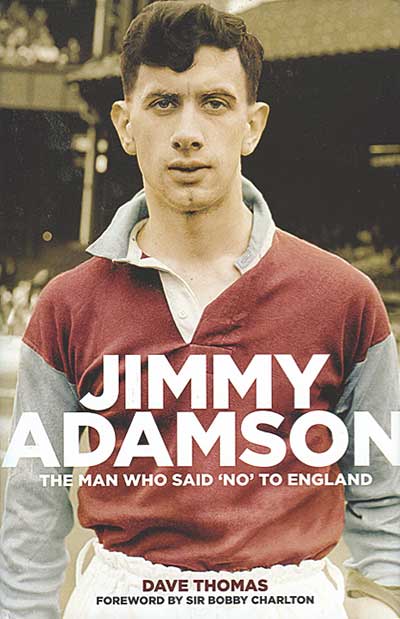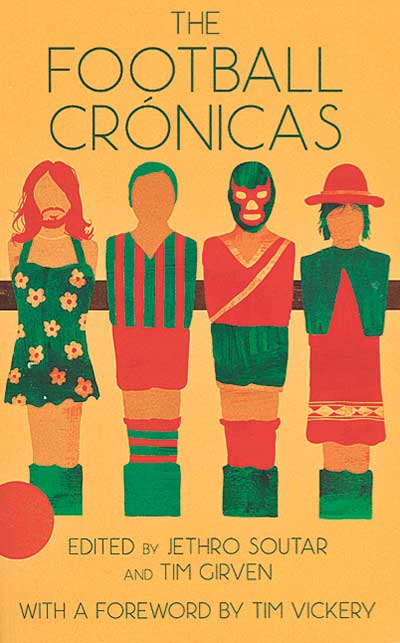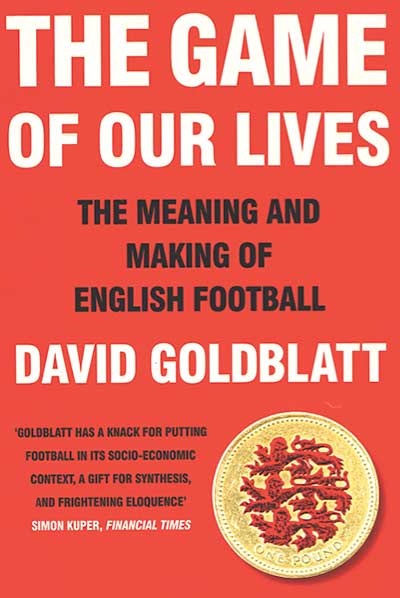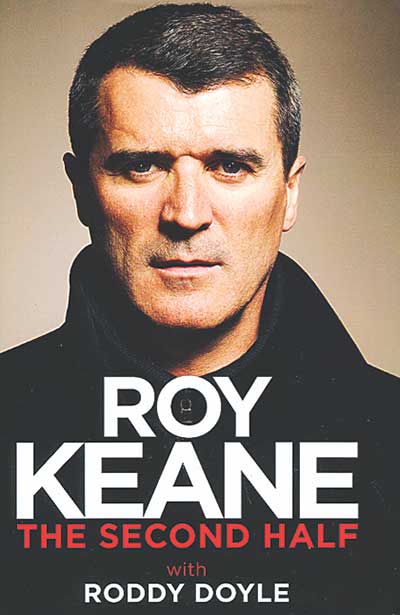{youtube}xRo0GtjG8UM{/youtube}
 The man who said no to England
The man who said no to England
by Dave Thomas
Pitch Publishing, £17.99
Reviewed by Harry Pearson
From WSC 335 January 2015
Jimmy Adamson was born in Laburnum Terrace, Ashington, a few doors along from Bobby and Jack Charlton. All three would be Footballers of the Year. They shared character traits too; Adamson had Big Jack’s abrasiveness and Bobby’s tendency to aloofness. Unfortunately he didn’t have the charm of the former, or the diplomatic skills of the latter. The result, as lifelong Burnley fan Dave Thomas relates, in this illuminating and well told biography, was a career that promised much but ended in frustration.
Adamson’s childhood was brutally hard. His father abandoned the family at an early stage; his mother’s struggle to raise her children on her own ended in depression and suicide. Later he would suffer the horror of having his two children predecease him.
Whisked away to Burnley as a teenager after the north-east clubs took their traditional path of rejecting a local star, Adamson started as a winger but soon switched to half-back. Intelligent, tough, with a rare ability to pick a pass, he quickly became one of the stars of the team that took the League title in 1960.
As a coach Adamson was ahead of his time, a thinker and a tactician. After serving as assistant to Walter Winterbottom at the 1962 World Cup, he was offered the England manager’s job but turned it down to stay on at Turf Moor as player and eventually – after some backstage shenanigans to oust incumbent Harry Potts – the manager.
From Potts, Adamson inherited a side rich in young talent, labelling it “the team of the Seventies”. Unfortunately the economics of football had changed since his playing days and small-town clubs such as Burnley now struggled to compete with the big-city sides. The resulting financial pressures brought Adamson into conflict with Burnley chairman Bob Lord. Sitting in the head office of his butchery business in front of a large portrait of Winston Churchill, the man Arthur Hopcraft called “the Khrushchev of Burnley” was a self-made autocrat straight out of satire. (Indeed, one of the many entertaining nuggets the author has dug out is the fact that Brian Glanville wrote a sketch about Lord for That Was The Week That Was. Sadly it was never performed.)
As “the team of the Seventies” were dismantled to pay for ground improvements and fend off debt (and to line Lord’s pockets, it is alleged) the once close relationship between the two men descended into acrimony. “I wanted to build a team, the chairman wanted to build a stadium,” Adamson famously remarked after the split finally came.
Away from Turf Moor, Adamson never really settled. A spell at the side he had wanted to play for as a boy, Sunderland, ended after a couple of inconclusive seasons, the appointment at Elland Road in 1978 was fraught with problems from the off. By then alcohol seems to have blunted Adamson’s talent and exacerbated his prickliness. After Leeds he did not work in football again.
Adamson continued to live in Burnley, but was so bitter about his treatment by Lord he refused to go and watch even after his nemesis had departed. Thankfully he eventually made his peace with the club he had served so well. He received a warm and heartfelt ovation from Clarets fans on his return to Turf Moor. It gave some semblance of a happy ending to a life marred by rancour and loss.
 edited by Jethro Soutar
and Tim Girven
edited by Jethro Soutar
and Tim Girven
Ragpicker Press, £10
Reviewed by Nick Dorrington
From WSC 335 January 2015
The Crónica is a Latin American literary form, somewhat akin to the output of the new journalism movement of the 1960s and 1970s, in which the author involves themselves, to some degree, in the story. Written from a bold and engaging first-person viewpoint, it is a form that is the subject of a number of dedicated magazines across Latin America.
It is through the medium of the Crónica that this collection explores the football and society of a region in which a team bus is shown more deference than an ambulance in traffic, where villagers gather on a hillside to get the best possible signal for the radio broadcast of a match and where entire cities can be brought to a halt by an important fixture. These entries are supplemented by a book extract in similar style and three short stories.
The standard varies a little from piece to piece but the overall quality of both the writing and translation is to be applauded. Authors from across South America, plus two from Mexico, have been included, writing on subjects as varied as a prison team in Argentina, a Latino immigrant league in New York and a team of transvestites in Colombia. The rare missteps occur when the focus is on well-known subjects such as Alcides Ghiggia or Romário.
One of the most interesting entries is by the Peruvian writer Marco Avilés. It tells the story of the women’s football team of a high Andean village where no Spanish is spoken and the comforts of modern society are not to be found. The women travel down to the nearest developed city to take on the local team in a match that Avilés bills as a battle of ojotas (rustic flip-flops) versus trainers; ancient tradition against globalisation.
The changing face of football is masterfully described in a wry short story about an elderly man denied access to a stadium due to his failure to produce a shop loyalty card. “Purchasing power is all that matters,” a steward tells him as the man fruitlessly describes the various triumphs and defeats he has witnessed in his many years in the stands.
The best pieces in the collection are those about people who for one reason or another stand on the margins of mainstream society. We sometimes forget that football, in its most basic form, can act as a unifier for communities, or provide a platform for those whose voice is rarely heard. This theme is beautifully summarised in the final entry, a short story by Vinicius Jatobá that provides a fictionalised account of the genesis of Brazilian football and the emergence of Leônidas da Silva in the docks of Rio de Janeiro.
Laced with local patois and references to the art, food and history of the region, the book is, at times, a challenging, even daunting read. Explanatory footnotes would have been a welcome addition. Yet it is still an enlightening and ultimately rewarding excursion into the football and culture of Latin America.
 The meaning and making of English football
The meaning and making of English football
by David Goldblatt
Viking/Penguin, £16.99
Reviewed by Alan Tomlinson
From WSC 335 January 2015
David Goldblatt writes with the authority of a serious academic theorist of the globalisation process, but displays a lucidity and fluency to match the best feature journalists and sport writers. In The Game Of Our Lives he draws on specialist journalism, consultancy reports, arcane academic findings, new media and personal observations to analyse how English football has both mirrored and anticipated the broader neo-liberal agenda over the last two or three decades. Citing JK Galbraith in his conclusion, Goldblatt argues that English football represents the triumph of unaccountable affluence for the few over the many whose experiences and hopes are increasingly defined by the deprivations that denies them access to the game’s new riches.
The book confirms how swiftly the Premier League seized power in the early 1990s, and how timid the FA were in defence of the traditional values of the game. There may have been reviews, commissions and discussion of the need for serious change and modernisation; but the FA never managed to act, beyond the backing of the Taylor report for reform following the Hillsborough tragedy. Yet the consequent modernisation of grounds, in significant levels publicly funded in the name of community and civic goals, was a transformative project that Rupert Murdoch must have thought was a ruse or a booby-trap. But no, here it was on the eve of transnational satellite broadcasting: a cleansed and modernised infrastructure for him to buy into and sell on worldwide. Rarely has any besieged culture handed the battering-ram to the invasive aggressor in such a naive and timid way.
Goldblatt knows the sport too, and this is far from any dry history of the economics and politics of the game. He conveys the enduring cultural appeal of football, the resonance of matchday in the face of the forces of “fragmentation and distraction” that the new mobile media bring to bear in threatening the crowd’s “unbroken engagement and shared experience”. Analyses of the culture of the game, including the lost genius of the flawed Paul Gascoigne and the global profile of the feted metrosexual David Beckham, alternate through the book with vignettes on the political and economic realities of the emerging neo-liberal agenda. He illuminates the meaning of the game in its Premier League phase, balancing an evocation of its excellence and attractions with a critique of its financing and governance, reminding us too of the collective values that originally made football possible in its modern form, and of the game’s capacity to offer models of co-operative endeavour.
In a synthesising achievement of this scale, errors will certainly have crept in, and Burnley’s former chairman Barry Kilby is presented as “benefactor… Barry Kidder”. Wigan Athletic were formed in 1932, not “the late 1970s”, which was when they replaced Southport in the League; England’s “first defeat by a foreign team at home” was not the Hungarian lesson at Wembley in 1953, but a 2-0 loss to Ireland at Goodison Park in 1949. But this is a superb study that will surely inform and sustain debate on the nature and culture of the game, and the impact of the excesses of the Premier League upon football’s rich cultural legacy.
 My autobiography
My autobiography
by Roy Keane and Roddy Doyle
W&N, £20
Reviewed by Dave Hannigan
From WSC 335 January 2015
Near the very end of this book, Roy Keane fondly remembers a night at Nottingham Forest when Brian Clough gifted him a £50 note for accompanying him to a charity event. For a 19-year-old neophyte in 1990, that was a substantial sum and the memory stuck with him. Yet, earlier in the narrative, he talks about telling his family they would all have to cut back after he departed Manchester United, by which time his personal fortune was, according to Sunday newspaper rich lists, well north of £20 million.
That sort of inconsistency is rife in these pages, as rife it would seem as it is in Keane’s personality. He hates publicity and craves anonymity yet for the past decade of his life, he has spoken out so often about so many topics that he’s the footballing equivalent of singer/shock merchant Sinead O’Connor. He’s livid at Alex Ferguson for criticising players and being disloyal but, as he trawls through his own managerial stints at Sunderland and Ipswich, he sticks the boot into those who he believes let him down.
If those sort of double-standards are infuriating, this is still a very entertaining account of the subject’s life since the publication of his first autobiography in 2002. Keane is forthright about most (crucially not all) subjects and, as fans of his fast-paced fiction will already know, ghostwriter Roddy Doyle has a wonderful light, comic touch. His handling ensures that this fairly crackles along while offering glimpses of life behind the scenes at Old Trafford, the Stadium of Light and Portman Road.
For all that though there’s something terribly dissatisfying here. Firstly, all the best gags lose their impact because you’ve already read them somewhere else. Secondly, several times you think Keane is finally going to open up about the demons that drive and torment him. Yet he doesn’t. Drink is discussed more than once but by the end of the book you are no nearer understanding the exact nature of his troubled relationship with alcohol.
Strangely for a memoir, he also swerves away from discussing his family. That may be his prerogative but when he makes references to the adverse impact of controversies on his wife and kids, you expect a little more substance about that side of his life. Surely, the very purpose of a serious autobiography is to show the man behind the lazy tabloid caricature.
Even if it is getting tiresome, Keane is still to be commended for having the guts to rail about Ferguson, the game’s most sacred sacred cow. Yet Irish readers in particular will be disappointed he hasn’t a single thing, positive or negative, to say about John Delaney, chief executive of the FAI, and beyond Keane himself, the most controversial figure in the sport in Ireland. Did the current Ireland assistant-manager pull his punches? Or is he learning to be smart when it comes to staying gainfully employed? Like so much else in this book, there remain more questions than answers.